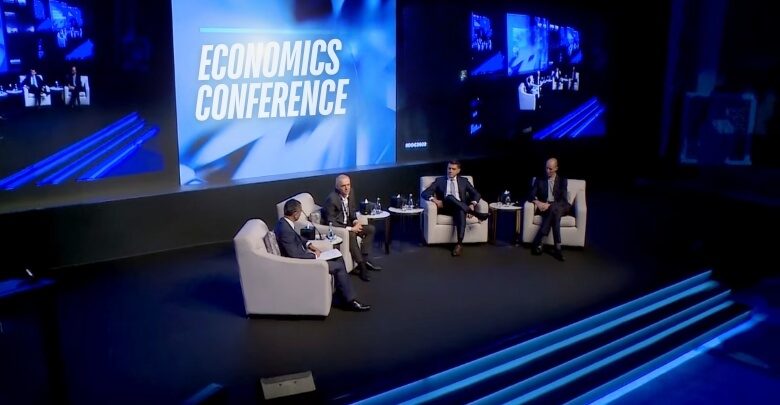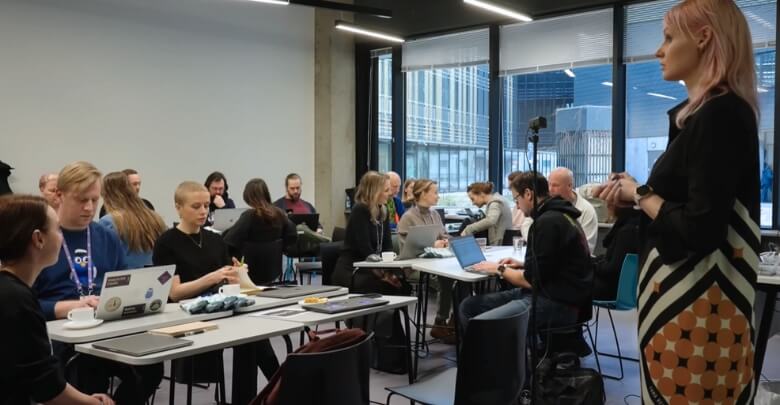Are you someone interested in economics and thinking about going to an economics conference? These conferences are like big meetings where people who study or work in economics come together to talk about economic stuff. But there’s one common question people often have: how long do economics conferences typically last?
Well, the answer to this question can be different depending on the conference. Some are short and just last for a day, while others can go on for several days. And nowadays, with online conferences becoming more popular, things can be a bit different too.
In this article, we’ll answer a common question: How long do economics conferences last? Whether you’re a student, researcher, or just curious about economics, we’ll explore the different durations, from one-day events to multi-day conferences, including online variations. Stay tuned for a quick guide on what to expect.
Brief Overview of the Economics Conference
Economics conferences offer a dynamic platform for professionals, scholars, and enthusiasts to convene and explore multifaceted economic subjects. These gatherings foster dialogue, knowledge exchange, and networking opportunities.
In these events, attendees engage in discussions, presentations, and workshops, gaining fresh insights into economic trends, policy developments, and research findings.
Economics conferences can vary in size and scope, from small, focused symposia to grand international conventions, often lasting for multiple days. For instance, upcoming economics conferences in Canada will offer a platform for participants to explore regional and global economic issues.
The rise of online conferences has expanded access to global economic discourse, enabling participants to connect virtually and participate in insightful sessions from the comfort of their own spaces. As hubs of intellectual exchange, economics conferences play a pivotal role in shaping economic thought and fostering collaborations that drive progress in this ever-evolving field.
How Long Do Economics Conferences Typically Last?
If you’re curious about economics conferences, one of the most common questions you might have is, “How Long Do Economics Conferences Typically Last?” These events bring together professionals, researchers, and enthusiasts to discuss various economic issues, policies, and advancements.
The length of an economics conference can vary greatly depending on the event’s purpose, scale, and format. Let’s explore the typical durations and what you can expect from each.
Single-Day Conferences (24 Hours)
Single-day economics conferences are concise yet impactful. These events are typically organized for those who may have limited availability but still want to engage with the latest discussions in economics.
In a span of 24 hours, attendees can experience keynote speeches from experts, several presentations, and often a networking session. The agenda of a single-day conference is packed with the essentials.
While there may not be time for deep dives into multiple topics, these conferences are great for individuals looking to stay updated on key trends or policies in a short time.
These events are also common for local or regional conferences where participants don’t need to account for extensive travel.
Two to Three Days (48-72 Hours)
Two- to three-day economics conferences are among the most common, offering a more immersive experience than single-day events. Over the course of two or three days, attendees are exposed to a wider range of topics, discussions, and activities.
These events usually feature multiple keynote speeches, panel discussions, breakout sessions, and workshops. Attendees have more opportunities to engage with presenters and network with peers, making it a great setting for both learning and forming professional connections.
The extra time allows for deeper dives into economic subjects like macroeconomics, policy-making, econometrics, or specific industry-focused economics discussions. Networking is also a crucial part of these multi-day events.
Participants often engage in evening receptions or luncheons that further facilitate interaction. For many, the chance to form lasting professional relationships is one of the biggest draws of attending an economics conference of this duration.
Longer Conferences (4 Days or More)
Some larger and more comprehensive economics conferences may extend beyond three days, offering attendees a full week or more of sessions, presentations, and workshops.
These longer conferences typically cover a broad range of economic topics and may offer specialized tracks for attendees with different interests, such as environmental economics, healthcare economics, or global trade and finance. Additionally, a research presentation at economics conferences during these events provides a platform for scholars to showcase their latest findings and engage with peers.
Longer conferences allow for more in-depth exploration of complex issues, and the extended format provides participants the flexibility to tailor their experience. Attendees can focus on the sessions that interest them the most while also having enough time to explore other topics.
Because of the longer duration, these events often attract attendees who are deeply committed to their professional development and want to fully engage with the content and networking opportunities.
Online Conferences (Varied Durations)
With the rise of digital platforms, online economics conferences have become increasingly popular. One major advantage of online events is their flexibility. Some online conferences may follow the traditional single-day or multi-day format, while others stretch over several weeks with sessions spread out to accommodate participants from different time zones.
The flexibility of online conferences makes them accessible to a broader audience. Attendees can participate in sessions that fit their schedules without the need to travel.
While the networking opportunities may not be as robust as in-person events, many online conferences now incorporate virtual networking sessions, allowing for professional engagement despite physical distance.
International Conferences (Several Days)
International economics conferences are typically longer, often spanning four or more days to accommodate the time and effort involved in international travel. These events gather professionals, scholars, and policymakers from around the world, making them ideal for those looking to collaborate on global economic issues.
The extended duration ensures that participants have enough time to network, attend presentations, and explore the host city. International conferences also tend to offer more in-depth programs that feature topics ranging from global trade dynamics and economic policy to region-specific economic challenges.
They often include cultural activities or excursions that add to the experience, making them both intellectually enriching and culturally engaging.
Supplemental Activities (Impacting Duration)
Many economics conferences include supplemental activities that can impact the overall duration of the event. For example, workshops, poster sessions, or social events might extend the schedule beyond the core agenda. These activities provide additional value to attendees by offering hands-on learning experiences or informal networking opportunities.
Some conferences even include professional development workshops or training sessions as part of their supplemental activities. While these aren’t mandatory, they are an excellent way to enhance your skills and make the most out of the event.
Customizable Experience (Aligning with Objectives)
Knowing the typical duration of an economics conference allows you to align your participation with your goals. Whether you’re looking for a compact, one-day event that covers the basics or a comprehensive, multi-day experience that allows for deep engagement, there’s an option that fits your needs.
Many conferences now offer customizable schedules, allowing you to attend only the sessions that interest you.
Valuable Insights and Networking (Regardless of Duration)
Regardless of how long an economics conference lasts, these events are packed with opportunities to gain valuable insights, connect with professionals, and stay informed about the latest trends in the field.
Shorter events may offer a quick, impactful overview, while longer conferences provide a more immersive experience. In any case, participants leave with new knowledge, skills, and connections that can enhance their careers and knowledge of economics.
By planning around the conference duration that fits your schedule and objectives, you can ensure a productive and rewarding experience.
Benefits of Attending at Economics Conference
Economics conferences offer a plethora of advantages to participants. These events serve as invaluable platforms for professionals, scholars, and enthusiasts to delve into economic trends, connect with peers, and expand their knowledge.
- Firstly: Firstly, conferences provide a unique opportunity for knowledge enrichment. Attendees gain access to the latest research, trends, and developments in economics through presentations, workshops, and discussions. This firsthand exposure ensures participants stay current and well-informed in their field, aligning with the broader purpose of an economic conference, which is to facilitate the exchange of ideas and promote innovation in the field.
- Secondly: Networking is a key benefit of economics conferences. These gatherings bring together experts, scholars, and practitioners from diverse backgrounds. This facilitates meaningful connections and opens doors for potential collaborations, job opportunities, and valuable professional relationships.
- Lastly: Conferences offer a chance for career advancement. Presenting research or actively participating in discussions can showcase expertise and attract attention from peers and potential employers. Additionally, many conferences provide opportunities to publish research in proceedings or journals, further enhancing one’s academic or professional profile.
Attending economics conferences not only enriches one’s knowledge but also provides a platform for valuable networking and career development, making them a worthwhile investment for professionals and enthusiasts in the field.
Common Challenges While Organizing an Economic Conference
Organizing an economics conference can be quite tricky. It involves dealing with various difficulties and complexities. Here are some common challenges that event organizers often encounter.
- Budget Constraints: Limited funds can impact venue selection, speaker invitations, and overall conference quality.
- Speaker Coordination: Can I Present My Research at an Economics Conference Coordinating schedules with keynote speakers and panelists can be challenging.
- Marketing and Promotion: Ensuring the conference reaches the target audience requires effective marketing strategies.
- Logistics Management: Overseeing travel arrangements, accommodations, and event logistics can be demanding.
- Program Coordination: Creating a cohesive and engaging program while accommodating diverse topics and speakers can be tricky.
- Attendee Engagement: Keeping participants actively engaged throughout the conference is essential for a successful event.
- Technology Hiccups: Technical issues during presentations or online conferences can disrupt proceedings.
- Unexpected Events: Dealing with unforeseen circumstances, such as cancellations or emergencies, can be stressful.
- Feedback Incorporation: Gathering and incorporating attendee feedback for future improvements is vital.
- Sustainability Considerations: Ensuring eco-friendly practices align with conference goals can pose challenges.
- Security Concerns: Addressing cybersecurity and physical security issues is crucial, especially for online events.
- Inclusivity and Accessibility: Providing equal access and accommodations for all attendees can be complex but necessary.
Organizing an economic conference requires meticulous planning to navigate these challenges effectively and deliver a successful event.
Tips for Making the Most of Your Time at the Economics Conference
Economics conferences offer a wealth of knowledge and networking opportunities, but maximizing your experience requires a thoughtful approach. Here are some tips to help you make the most of your time:
Plan Your Schedule Wisely
Before the conference, review the program to identify sessions, workshops, and speakers that align with your interests and objectives. Prioritize those that will contribute most to your goals, but also leave some flexibility to explore unexpected opportunities that may arise during the event.
Actively Engage in Sessions
When attending presentations and panel discussions, participate actively. Ask questions, share your insights, and engage in meaningful discussions to deepen your understanding of the topics.
Network with Purpose
Networking is a significant aspect of conferences. Identify individuals you’d like to connect with, whether they are experts in your field or potential collaborators, and make an effort to engage in meaningful conversations.
Take Comprehensive Notes
Carry a notebook or use a note-taking app to record important points, key takeaways, and ideas from sessions. These notes will serve as valuable references after the conference and can help you organize your thoughts for future research or discussions.
Explore Poster Sessions
Don’t overlook poster sessions, as they often showcase groundbreaking research. Interact with presenters to gain fresh insights and explore opportunities for future collaborations. These sessions provide a unique platform for in-depth discussions and the discovery of emerging trends in your field.
Attend Social Events
Social gatherings and receptions provide a relaxed setting for networking. Take advantage of these events to build connections with fellow attendees and speakers. Don’t limit your conversations to work-related topics; sharing personal interests can also foster meaningful connections.
By following these tips, you can ensure that your time at the economics conference is not only productive but also personally enriching.
Frequently Asked Questions
What factors determine the length of an economics conference?
The length of an economics conference is influenced by several factors. One key factor is the scope and size of the event. Larger conferences that cover a wide range of topics or have multiple tracks often span several days to accommodate various sessions, panels, and workshops.
Another factor is the number of participants and speakers. Conferences featuring many keynote speakers, presentations, and networking opportunities typically require more time to ensure everyone has the chance to present and engage meaningfully.
Lastly, location and format also play a role. International conferences may last longer to account for travel, while virtual conferences can be more flexible, sometimes spreading sessions over several days or weeks to fit diverse time zones.
Do economics conferences usually run for more than one day?
Yes, most economics conferences typically run for more than one day. Multi-day events allow for a deeper dive into various topics, including keynote speeches, panel discussions, and networking opportunities. This extended format helps attendees explore subjects in-depth while connecting with professionals from around the world.
How long do virtual economics conferences usually last?
Virtual economics conferences typically last between one to three days, depending on the event’s scope. Some may even extend over several weeks with sessions spaced out. The flexibility of virtual formats allows participants to attend key discussions and workshops from the comfort of their own space without travel constraints.
Do larger economics conferences extend beyond three days?
Yes, larger economics conferences often extend beyond three days. These extended events allow for in-depth discussions, multiple tracks on various topics, and ample networking opportunities. Attendees benefit from a more immersive experience, engaging in keynote speeches, workshops, and panel discussions that cover a wide range of economic issues.
How long are keynote sessions typically at an economics conference?
Keynote sessions at economics conferences typically last between 45 minutes to an hour. This allows the speaker enough time to present their insights in depth, while also leaving room for a Q&A session. These sessions are designed to be engaging and thought-provoking, setting the tone for the rest of the event.
Bottom line
Economics conferences are valuable gatherings for anyone interested in the field. Knowing “how long do economics conferences typically last?” helps you plan your participation effectively, from short one-day events to longer multi-day conferences, including online variations.
Additionally, attending these conferences offers a wealth of benefits. You can enhance your knowledge, connect with like-minded individuals, and even advance your career. These events foster learning, networking, and collaboration in the ever-evolving world of economics.
So, whether you’re a student, researcher, or simply curious about economics, understanding conference durations and their advantages allows you to make the most of these enriching experiences. It’s all about aligning your goals and availability with the right conference duration to ensure a fruitful and fulfilling participation.








